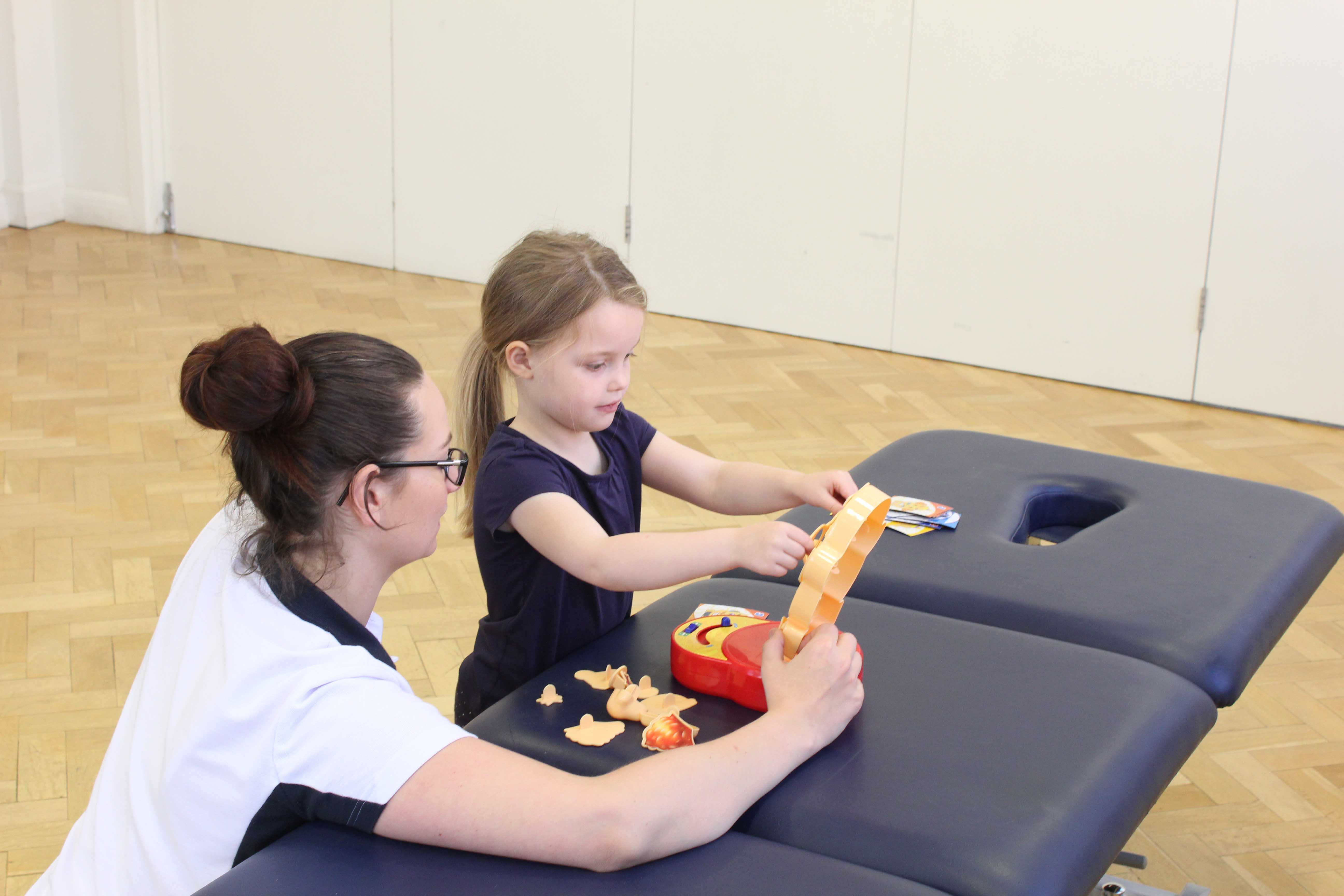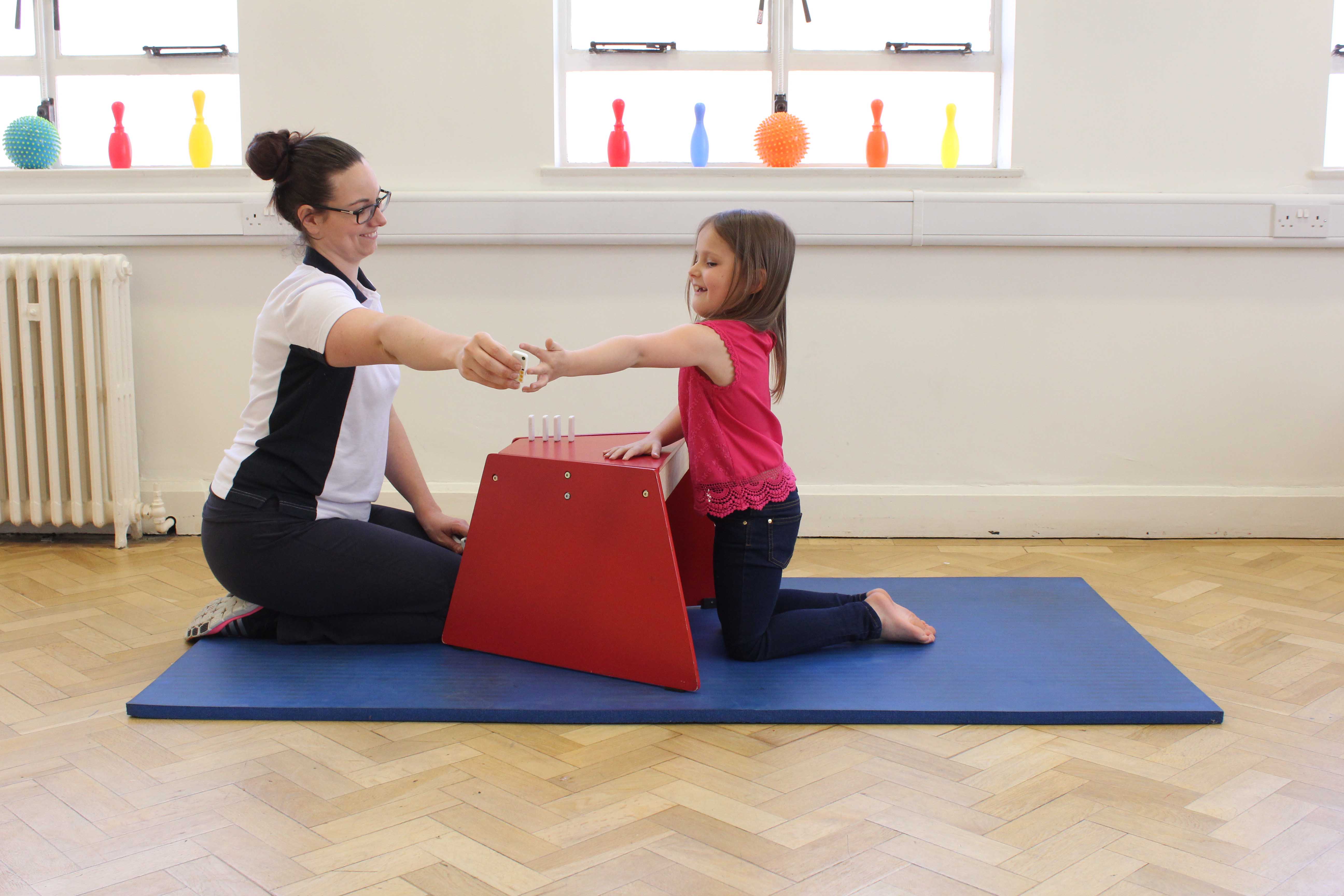What are paediatric fine motor skills?
Fine motor skills involve the small muscles of the body that provide movements in areas such as the hands, fingers and eyes. Fine motor skills are also responsible for the coordination between these areas i.e. hand and eye coordination. Fine motor skills enable activities such as eating, writing, grasping objects, typing and dressing. These skills are also known as fine motor dexterity.
The ability to perform fine motor skills develops over time and during early childhood. The skills begin by grabbing at larger objects and then slowly develop to movements involving more definitive hand and eye coordination such as drawing and fastening clothing.
 Above: Working on improving fine motor skills through play
Above: Working on improving fine motor skills through playImpairments of fine motor skills in children
Effective fine motor skills are extremely important in order to carry out everyday activities. Problems in a child’s development of fine motor skills can occur for many reasons and could be a result of neurological impairments, illness, delayed development or injury. Weaknesses in the small muscles that are responsible for these movements will affect a child’s ability to perform activities such as:
- Getting dressed
- Eating independently
- Writing
- Using a computer
- Grooming
- Washing efficiently
- Turning pages of a book
 Above: Testing fine motor control with therapist led exercises
Above: Testing fine motor control with therapist led exercisesSymptoms of fine motor skills in children
Children with fine motor skill weakness may also present symptoms such as perceptual difficulties, poor auditory memory skills, reduced confidence as speakers and listeners, and poor verbal comprehension skills.
Development timeline
There is a normal pattern to a child’s fine motor development as shown below. If the child is behind this timeline then they may have problems with their fine motor skills.
6 months
Uses both hands to reach for, and grasp, objects. Will occasionally use one hand.
Uses whole hand to grasp object.
Can pass object from one hand to the other.
12 months
Picks up small objects.
Uses pincer grasp with thumb and index finger.
Reaching and grasping actions becoming one smooth action.
18 months
Picks up small objects quickly using fine pincer grasp.
Holds pencil at middle or top with whole hand or attempt at thumb and fingers grip.
Beginning to show favoured hand.
2 years
Can pick up and place tiny objects quickly and accurately.
Holds pencil near point and uses thumb and fingers grip.
Can turn single pages in a book.
3 years
Can build a tower of up to ten blocks using both hands cooperatively.
Can use pencil with good control.
Can cut with toy scissors.
4 years
Can use blocks to build small bridges on request and small steps on demonstration.
Can imitate touching each finger with thumb.
Can use pencil with proper grip and control, like an adult.
What can physiotherapy do to help children with reduced fine motor skills?
Physiotherapy is a highly valuable method of treatment to help in the development of essential fine motor skills. Specialist physiotherapists at Physio.co.uk will provide your child with a thorough assessment that aims to identify the key problems that are effecting fine motor skill development. Results from the assessment will then provide the physiotherapist with clear treatment options which will help improve the child’s fine motor skills. Fine motor skill weaknesses can improve with therapy that is both fun based and functional based and involves a number of activities including:
- Cutting activities
- Writing activities
- Placing objects in correct places
- Tracing and colouring activities
- Self-care skills e.g. washing, bathing, locking and unlocking door, opening and closing jars, carrying
- Dressing e.g. buttoning, lacing, tying, fastening, snaps, zipping, etc.
- Pre-writing or drawing e.g. dot to dot of shapes, pictures, objects, numbers and letters
- Typing exercises
- Folding activities
- Sorting – small objects such as paper clips, screws, bolts, buttons, etc.
- Clipping things together – using pegs, paper clips, etc.
- Tracking and maze activities
- Modeling with clay plasticine or dough
- Painting and printing
- Jigsaw puzzles and peg boards
- Building blocks, Lego, Jacks or marbles
- Computer-aided picture and design activities
- Sewing activities
- Finger puppets
What are the benefits of physiotherapy for children with reduced fine motor skills?
Physiotherapy can have several benefits for children with reduced fine motor skills. These can include:
- Improving the child’s control of small movements
- Improving the child’s coordination during small movements
- Improving the child’s dexterity
- Improving the child’s overall function such as writing and dressing
Summary
Fine motor skills are the small muscle movements that are responsible for movements in areas such the hands and fingers in coordination with the eyes. Problems with the development of fine motor skills can cause difficulties for the child when attempting certain activities such as writing, drawing and self-care. Physiotherapy is an effective method of treatment to help improve the development of the child’s fine motor skills that may have been affected as a result of neurological conditions or other impairments. Specialist physiotherapists at Physio.co.uk will carry out an assessment to identify your child’s problems and will provide a treatment plan involving a number of activities.
To book an appointment or for more information about paediatric fine motor skills contact us or call 0330 088 7800.

 0330 088 7800
0330 088 7800

































